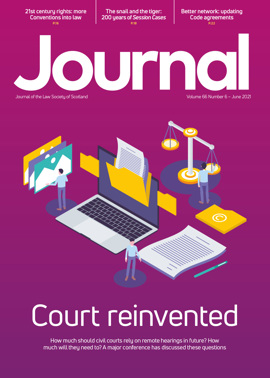Climate change, inequality and the profession
A we approach the delayed COP26 conference, in Glasgow in November 2021, the Society’s COP26 and Climate Change Working Group has been working on raising awareness of climate change issues of significance to the profession. Here, we explore the relationship between inequality and climate change, with a focus on the legal profession.
The COP26 conference is committed to urgent climate action to identify progress towards the goal of limiting global warming to well below 2°C, while pursuing efforts to limit the increase to 1.5° as set out in the binding 2015 Paris Agreement on climate change. As COP26 is a globally significant event for Scotland, UK and the world, this is an important opportunity to consider the relevance of inequality and our responsibilities as individuals, lawyers and the wider legal profession.
Effect of climate change
While all countries feel the impact of climate change, they are not equally affected. Many developing countries have been affected by the impacts of global warming, especially those countries relying on natural resources that have limited capacity to deal with landslides and floods. Countries have “common but differentiated responsibilities”, in that all states are responsible for addressing the global environmental destruction but do not have equal responsibilities. This inequality between states has enhanced the injustice caused by climate change that needs to be addressed collectively.
What is inequality?
Inequality is a term with which most of us are very familiar, especially those who deal with discrimination and employment law. The need to combat inequality underpins and permeates much of our legal work, whether in advising clients on relevant legislation or by contributing to Government policy development. Its importance is vital when ensuring respect and dignity for all in our society, in maintaining fairness and upholding the rule of law, and in supporting the values, in our case, of our Scottish legal system.
When defining inequality, we may refer to the “protected characteristics” that include sex, race, religion and belief, and age. Inequality is traditionally associated with vulnerability, where climate change has and is continuing to have a significant impact on parts of our society.
For instance, climate change is recognised as affecting women, who constitute the majority of the world’s poor. They depend on food and income from the land, and natural resources such as water, forest and energy resources on which they depend for survival are under threat. Age is a factor too, as older adults may be affected through rising temperatures where heat exposure increases the risk of illness and death among those already living with chronic health conditions.
Inequality should also be understood in the context of the distribution of wealth, as it carries significant economic and societal importance affecting political decision making and the allocation of resources. This is an important theme when we consider our role in Scotland and our citizens as one of the rich and developed countries.
What should we do to behave in a fair manner?
The Society’s Report on the COP26 and Working Group Survey of the Profession, published in December 2020, recognised that climate change will have significant long-term impacts on us all. Though the COVID-19 pandemic has required our immediate focus, allocation of time and resources, and has had significant impact, there was a telling observation made that there “will always be something ‘more important’ that needs immediate attention that will always come before climate change until one day…[there are] no more days left to deal with it”.
Society agrees about the need to address climate change. Though there may be plans for the next few years, it is the longer term ‘how’ that remains uncharted. Many of our activities, including the use of technology, generate greenhouse gas emissions. There is biodiversity loss. To meet climate change ambitions, there will need to be changes to the ways we do things, and that will have consequences for all of society, including the workforce. Changes may come at a cost; we along with other countries must bear the economic and political costs, notwithstanding the potential effect on commercial viability.
Co-operation at all levels is required. That starts from individual actions by seeking different methods, looking to greener ways of undertaking activities, seeking ways to collaborate and influence others domestically and internationally through our actions. If nothing is done, the gap between our rich nations and the impact of inequality will be felt more acutely, with an estimate of 132 million people being pushed into poverty over the next 10 years, reversing any progress made to date.
We have seen the effect of COVID-19 on inequalities in our society. Just as for COVID-19, as lawyers we should reflect on the potential impacts of climate change in advising clients, planning for the future, influencing policy, and providing greener offices. Our decisions today affect that future. More importantly, the profession can seize this chance to address inequalities. Avoid the mistakes of previous industrial transitions, by building on the steps taken to date to transition to net zero by means of “collective national endeavour, especially in this year of COP26”, as the Just Transition Commission recognised.
Now for the individual role, as Mary Robinson suggests, and our survey emphasised: “You’ve got to take the issue of climate change very personally, in your life and in your work. It has to somehow penetrate. Get angry with those who have more responsibility... Use your voice, your vote, your marching, and your teaching. It is the only way we’ll see real change.”
COP26 has given those in Scotland an opportunity to be heard and tackle inequality – let’s embrace it.
The working group is interested in hearing from members as to what they may be doing which can be included in its news/wider communications planned leading up to COP26.
If you wish to get your business involved, you can find out more about the Race to Zero Campaign, and visit the SME Climate Hub.
Lawscot COP26 Conference | Lawyers and climate change: leaders or followers?
Our Lawscot COP26 Conference is fast approaching. Book your place now as we bring together lawyers from across the globe to discuss the role of the lawyer on environmental impact.
Perspectives
Features
Briefings
- Criminal court: Doing justice with benefit fraud
- Corporate: Clarity is king – win some, lose some
- Agriculture: TFC provides holdings compliance guide
- Employment: Unintentional wrongs and injured feelings
- Sport: Where now for worker status?
- Intellectual property: IP and artificial intelligence
- Property: EWS1: another hurdle for the lawyer
- Scottish Solicitors' Discipline Tribunal
In practice
- Society's new office bearers step up
- AGM hears of a challenge met
- How do you manage the bank manager?
- Letters of engagement: one size does not fit all
- Climate change, inequality and the profession
- Fairness and justice: nice and simple does IT
- Profile: Craig Connal
- The Eternal Optimist: Difficult, or just different?
- Ask Ash: An anxious return







